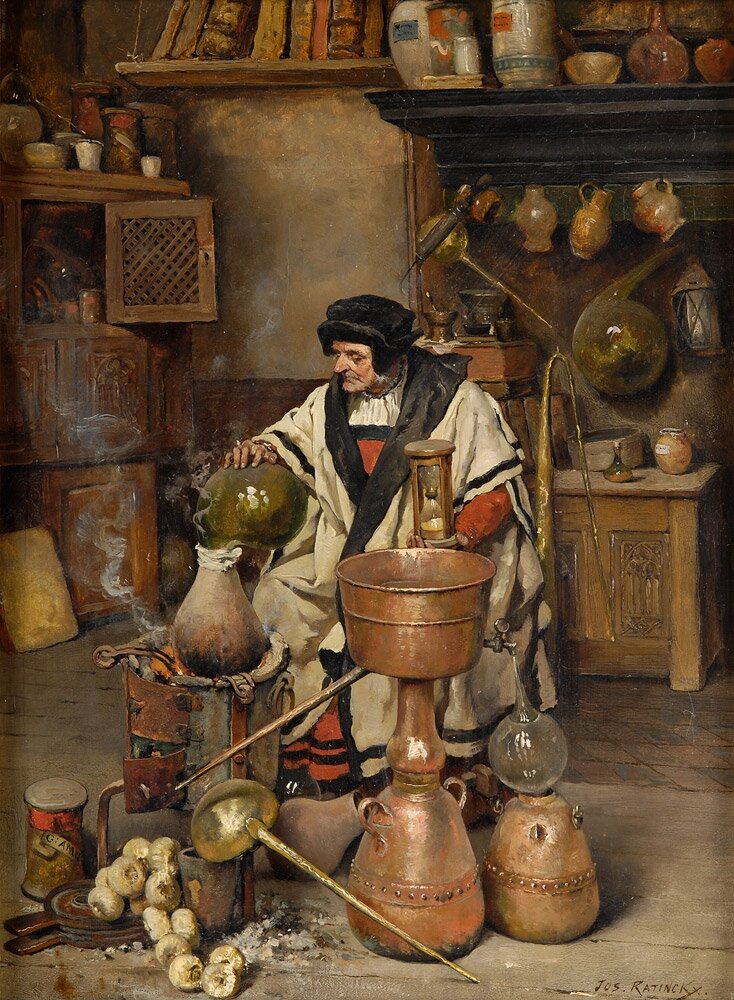Explosive Flavor

Everyone knows that poisoners need training in how to handle poisons or else they risk poisoning themselves. Why doesn’t anyone worry about alchemists, who work with equally deadly chemicals?
Everyone knows that rogues, assassins, and other poisoners need special training in how to use and handle poisons or else they risk poisoning themselves. Why doesn’t anyone worry about alchemists, who work with equally deadly chemicals?
Working any kind of reactive chemical is potentially dangerous. In the modern world, we’re very aware of the toxic and carcinogenic potentials of many of either our common household products or else the ingredients that go into making them. Sulfuric acid, lead, cyanide, and any number of other products have important industrial uses but can be incredibly deadly to someone improperly exposed, so we’ve learned the importance of protecting people who work with them. Somehow, though, this is something that’s been totally forgotten in most medieval fantasy games. Sure, our rules systems remind us that if you’re going to coat a dagger with deadly poison, you ought to be careful not to accidentally nick yourself while doing it, but while a poisoner might be in one room of a tavern taking painstaking care to apply giant spider venom to an arrow, in the very next room, there might be an alchemist juggling bottles and vials full of acids, incendiaries, poisonous gases and unpredictable mutagens. By all rights, your average alchemist should be in a lot more danger for accidental self-harm than almost any other character class, but in the name of game mechanics and speed of play we forget about it for the most part despite the huge storytelling (and comedic) potential.
Let me give you an example of just one of the ways that alchemists put themselves at risk: poisoning during bomb-making. We can all imagine the danger of working with flasks of acid and oils that catch fire on exposure to oxygen, but in my gaming experience, the most popular concoctions among the vast majority of alchemists are explosives. The rules seem to assume that an alchemist’s bombs are totally inert until the moment that two liquids are mixed together and thrown, but this vastly underestimates the inherent toxicity of the chemicals themselves.
There’s actually a fairly large body of knowledge in the medical literature about explosive experts being poisoned by the ingredients they work with. My personal favourite is C4, the go-to bomb-making material of many a game but which has been an important cause of poisonings for nearly a century. Bomb-sniffing dogs get exposed to C4 when they mouth it, and humans get exposed to C4 when they inhale particles after an explosion or, more commonly, in one way or another ingest it. This isn’t nearly as rare as you might think, in part because things just happen in the field – tins get mixed up, contents spill and mix – but also because it turns out that C4 is mildly intoxicating, with an effect described as similar to having a couple of beers, which itself suggests that one of the ingredients in C4 probably directly supresses or damages the central nervous system. Roughly two hours after ingesting a bite-sized piece of C4, and persisting for probably about 12 hours, people risk developing seizures, fainting, headaches, vomiting, abdominal pain, weakness, and dizziness. In a study of 17 people poisoned like this, two developed slow heartbeat and three developed low blood pressure, and none of them died.
While every explosive chemical has its own different risks, and the dangers of inhaling gunpowder fumes are entirely different than the risks of biting the corner off of a block of C4, it does illustrate some of the things that could happen to an alchemist all too easily, particularly those who live in campaign settings where illness isn’t well understood and who may have no conception that the chemicals they work with are dangerous, as was true for long periods of our own history. In a game, this might manifest as a small risk of poisoning oneself while preparing the day’s reagents, or a possible consequence of rolling a natural 1 in combat. It might also be used tactically or offensively, as it open up tools by which alchemist can poison other creatures. Developing rules for the toxicity-related dangers of working with chemicals risks making the game more cumbersome, but also adds new options and new opportunities for creative thinking, as well as hilarious misfortune and complication.
More than four years ago, Dr. Eris Lis, M.D., began writing a series of brilliant and informative posts on RPGs through the eyes of a medical professional, and this is the one that appeared here on October 4, 2015. Lis is a physician, gamer, and author of the Skirmisher Publishing LLC OGL sourcebook Insults & Injuries, which is also available for the Pathfinder RPG system.






